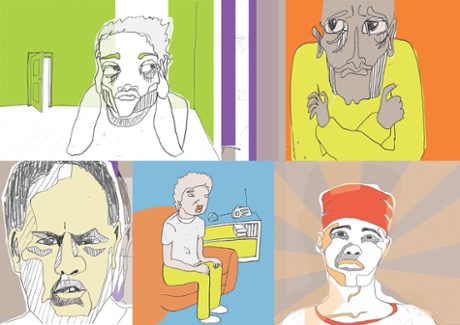
A man’s role within cultures that practice FGM is often encompassed by behaviour that can be both brutal and blase at the same time. While every context carries its own detail, identifying the major attributes in their relationship with FGM can be the first step in turning men into drivers of change.
Mr apathetic
Men can afford to be blase about FGM because the dirty end of the work – the physical mutilation – is usually carried out by older women.
Just as wartime generals never have to descend into trenches, this distance from the mutilation allows men the illusion of absolution and the comfort of not seeing the immediate horrors of the practice. “FGM is women’s business,” they say. “Go ask them why it’s done.”
As the dominant gender wherever FGM is practiced, fathers and brothers need to be given a graphic understanding of the practice – both in order to visualise the horror and also to discount the casual (and grossly inaccurate) comparisons made with male circumcision. The Cruel Cut on Channel 4 did this to great effect with Somali youth in the UK.
Mr aggressive
A man goes from being dismissive to actively aggressive when consummating his marriage to a woman who has undergone the cut.
The trauma of the initial procedure is relived when the vagina has to be opened up for intercourse and childbirth. Even where the type of FGM is supposedly “lighter” and without stitching, the trauma can be compounded by the fact men are conditioned to connect male virility with force and domination.
Challenging these concepts is hardest of all, since it requires communities to come up with new concepts of masculinity – something every society is struggling with.
Mr anxious
The irony is that most men are oppressed by their own notions of masculinity and see it very much as a social demand expected of them, sometimes even by a brutalised partner.
Virtually all the FGM husbands I have spoken to are initially shamed by the pain that is inflicted but later tend rationalise it as collateral damage inevitable in the preservation of culture and traditions.
Parents, too, can feel a terrible apprehension and loss of immediate control over events. I remember sitting next to a very troubled father in western Sudan who pleaded with an over-excited group of older women to “be light” with his four daughters during the family’s circumcision ceremony.
I later learned that being light in that context meant the excision of the entire clitoris along with the inner labia – a procedure which was still a few steps short of the most extreme form of FGM common to that region which involves even more severe cutting and stitching.
This underlying disquiet among men should encourage campaigners as this offers the opportunity to start conversations about how unnatural FGM seems once it’s removed from cultural and religious justifications.
Mr misinformed
Some men hide behind misinterpretations of religion and see any attempt to stop FGM as a western conspiracy to corrupt and liberate women.
This is a legitimate concern that needs to be addressed. While the campaign to end FGM cannot be isolated from the emancipation of women and girls, campaigners need to assure very traditional and religious communities that stopping the practice is not the first step towards binge drinking on Saturday nights.
For their part, faith groups also need to be vocal in articulating their own vision of female emancipation.
When separated from the larger issues, however, the religious arguments for the practice are very feeble. In Islam, for example, the supposed tradition of the prophet that called for FGM to be done “lightly” has been declared unsound and unreliable by major scholars.
Mr apologist
There are men in the west who justify FGM as a quaint local tradition that needs to be respected. They fear being accused of neo-colonialism but the real reason for their ambivalence is a profound indifference to the suffering of young girls and women who live beyond their world.
Advocates of the so-called “lighter” types of FGM offer these apologists the opportunity for compromise and campaigners need to be especially careful of arguments around “cultural relativism” as a justification for not standing up against the practice.
Still, none of the above should allow campaigners to vilify men or dismiss them as a lost cause in the struggle against FGM. Just as a nation can’t be free while it oppresses another, millions of men understand that their own emancipation depends upon the creation of new partnerships with women. With a sensitive and inclusive approach, men can become strong allies for the campaign.
Khalid Roy trained as a social anthropologist and spent 20 years working with local and international NGOs in Africa and Asia. Follow @Khalidroy69 on Twitter.
Read more stories like this:
• FGM in Kenya: ‘to end this culture we have to make everyone accountable’ - video
• FGM and child marriage: grandmothers are part of the problem and the solution
• Why should the British public care about FGM?
• How to engage boys and men in the fight for gender equality
Join the community of global development professionals and experts. Become a GDPN member to get more stories like this direct to your inbox

